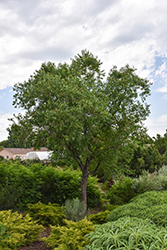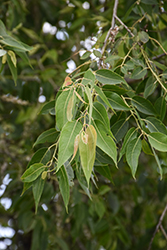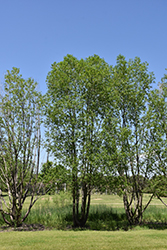It's all about ...
plants

Height: 70 feet
Spread: 40 feet
Sunlight:
![]()
Hardiness Zone: 2a
Description:
A tough, durable shade tree with ascending branches; adaptable to all soils, and prefers moist to wet conditions, tolerating temporary flooding; fast growing but short lived; tends to drop branchlets, aggressive root system, so do not plant near homes
Ornamental Features
Peach-Leaved Willow has rich green foliage with bluish-green undersides which emerges chartreuse in spring on a tree with an upright spreading habit of growth. The serrated narrow leaves turn gold in fall. The rough gray bark and brown branches add an interesting dimension to the landscape.
Landscape Attributes
Peach-Leaved Willow is a dense deciduous tree with an upright spreading habit of growth. Its average texture blends into the landscape, but can be balanced by one or two finer or coarser trees or shrubs for an effective composition.
This is a high maintenance tree that will require regular care and upkeep, and is best pruned in late winter once the threat of extreme cold has passed. Gardeners should be aware of the following characteristic(s) that may warrant special consideration;
- Messy
- Invasive
Peach-Leaved Willow is recommended for the following landscape applications;
- Shade
- Windbreaks and Shelterbelts
Planting & Growing
Peach-Leaved Willow will grow to be about 70 feet tall at maturity, with a spread of 40 feet. It has a low canopy with a typical clearance of 6 feet from the ground, and should not be planted underneath power lines. As it matures, the lower branches of this tree can be strategically removed to create a high enough canopy to support unobstructed human traffic underneath. It grows at a fast rate, and under ideal conditions can be expected to live for 40 years or more.
This tree should only be grown in full sunlight. It is quite adaptable, prefering to grow in average to wet conditions, and will even tolerate some standing water. It is not particular as to soil pH, but grows best in rich soils. It is highly tolerant of urban pollution and will even thrive in inner city environments. This species is not originally from North America.


